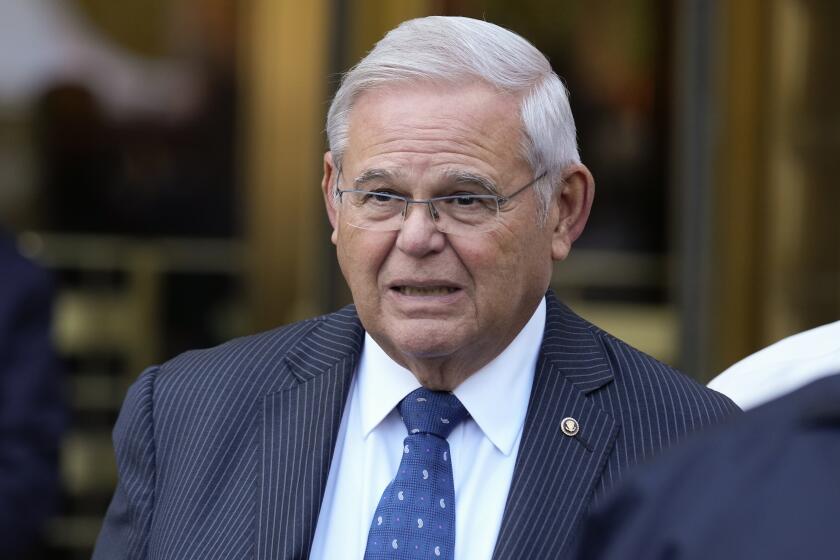New Genocide Is Feared in Festering Congo
With a growing rebellion in Congo pulling its Central African neighbors toward war, analysts warn that Congolese President Laurent Kabila risks igniting new genocide against the region’s Tutsis by turning to the flammable ingredients of ethnicity and nationalism.
Facing an alliance of Congolese Tutsis, exiled politicians and disgruntled soldiers, Kabila seized on a weapon that is simple and effective--whether in Africa or elsewhere.
He publicly appealed to his people in an August radio broadcast shortly after the outbreak of fighting to “take up arms, even traditional weapons--bows and arrows, spears and other things”--to kill Tutsis. “Otherwise,” he said, “they will make us their slaves.”
The rebellion has split Congo, Africa’s third-largest nation in size, between the government-held west and south and the rebel-controlled east. After only about a year and a half in power, Kabila is in danger, and no political settlement is in sight.
As many as six other countries already are involved. Angola, Zimbabwe and Namibia, which along with Chad have sided with Kabila, announced Wednesday that they had agreed to start an offensive in eastern Congo, where the rebels recently captured a strategic town.
Zimbabwean President Robert Mugabe said the fighting will be long, costly and difficult but pledged that Congo will not fall into rebel hands.
Analysts say neighbors such as Zimbabwe and Angola have strong economic reasons for seeking to keep Kabila in charge of mineral-rich Congo, formerly Zaire.
Rwanda, which is ruled by a Tutsi minority, and Uganda support the rebels. Despite many eyewitness accounts to the contrary, Rwanda denies it has troops in Congo. But in light of the 1994 genocide that killed 800,000 people in Rwanda, most of them Tutsis, Rwanda said it reserved the right to intervene to protect Tutsis and ensure its own security.
The U.S. ambassador to Congo, William Lacey Swing, publicly has accused Rwanda and Uganda of “external military interference in Congo.”
“There’s an awful danger of it spilling over,” I. William Zartman, director of African studies at Johns Hopkins School of Advanced International Studies in Washington, said of the conflict.
Kabila Whips Up Ethnic Tensions
After the Rwanda genocide and subsequent Tutsi-Hutu fighting that spilled over to become a key element in Kabila’s drive to oust dictator Mobutu Sese Seko last year, Kabila’s latest move further whips up volatile tensions.
Critics accuse him of “hate-mongering” and fear a new genocide equal to that of 1994.
Ethnic Tutsis number about 2.3 million in East and Central Africa, primarily in Rwanda, Burundi and Congo, with a small immigrant population in Uganda. Analysts say their relatively small numbers make them feel vulnerable.
Historians say other ethnic groups, chief among them the Hutus whom Tutsis dominated for centuries, traditionally resent the economically successful Tutsis. Tutsis are often accused of being high-strung and arrogant, and German and Belgian colonizers proclaimed them a superior race, deserving of Western education and favored treatment. This only increased tensions.
Within Congo, where many Tutsi families have lived for 100 years or more, they still struggle with the perception that they are outsiders.
Kabila has accused Tutsis and a related group in Uganda, the Himas, of trying to create a Central African empire. He has worked hard to convince Congolese that the rebels are foreign invaders and says he wants to take the war to the doorstep of Rwanda. But once there, it would be difficult to contain and could easily spill back over into Rwanda, Burundi and possibly Uganda.
Local witnesses, human rights activists and journalists say mass killings of Banyamulenge, Congolese ethnic Tutsis, already have occurred in western and eastern Congo.
Diplomats and foreign relief workers in Congo’s capital, Kinshasa, who spoke on condition of anonymity, say average people are heeding Kabila’s inflammatory rhetoric.
Witnesses report that security forces as well as average people have harassed, beaten and killed Tutsis or anyone sharing their stereotypical features--long limbs and fine bones.
Tutsis Interned at Kinshasa Camp
Dozens of Senegalese and Malians, West Africans who often look similar to Tutsis, fled to their embassies in Kinshasa for safety after Kabila’s public criticism of Tutsis, said one West African diplomat in Kinshasa at the time.
At least 150 Tutsis or their relatives have been interned at a camp in Kinshasa, and a similar number at the capital’s Penitentiary and Rehabilitation Center, according to Red Cross officials who visited them. In addition, an unknown number are being held in Kabila’s southeastern stronghold of Lubumbashi, Congo’s second-largest city.
Congolese officials say that the Tutsis have been detained for their own safety and that they are having a difficult time finding a secure place for them in Congo.
“Even those who don’t like Kabila are ready to do something [against Tutsis],” said Mbwebwe Kabamba, a leader of the Patriotic Front, a moderate Kinshasa-based political group. “Their rejection of the Rwandan people is more powerful than their detraction of Kabila.”
The rebels claim an estimated 20,000 Tutsis have fled alleged massacres by Kabila’s troops in the president’s home province of Katanga in the southeast, and mass graves of Banyamulenge killed by retreating government soldiers have been found in the northeastern commercial city of Kisangani. Their claims could not be independently confirmed.
Critics of Kabila blame him for inciting slaughter.
“This kind of hate-mongering is precisely what preceded the Rwandan genocide in 1994,” said Njonjo Mue, a Johannesburg, South Africa-based legal advisor for Article 19, the International Center Against Censorship, which has called on the United Nations to investigate charges of promoting genocide leveled against Kabila and prosecute him if they prove true. “We want to ensure that any genocidal tendencies are preempted.”
Even excluding the Rwanda genocide, ethnic politics have led to epic horrors on the African continent in the past.
South Africa’s apartheid-era government pitted Zulu and Xhosa peoples against each other in an attempt to divide and rule. Thousands of Acholi and Langi people, who used to dominate the Ugandan army, were killed under dictator Idi Amin’s 1970s regime. Angola’s 20-year-old war has seen fighting between the primarily mixed-race or assimilated northern-dominated government and a rebel movement that has roots primarily among the Ovimbundu of southern and central Angola. And an estimated 1 million Ibos died in Nigeria’s Biafran war for secession from 1967 to 1970.
In Kenya, President Daniel Arap Moi has used the threat of ethnic violence to downplay the need for democratic reforms.
Mobutu, whom Kabila chased from power in May 1997, took away the citizenship of ethnic Tutsis in the 1980s even though most of their families have lived in the Central African nation for at least 100 years.
Pronouncements by some prominent Tutsis that chunks of Congo’s Kivu province in the east actually belonged to their group’s Rwandan kingdom before Rwanda’s colonization by Belgium after World War I have fueled resentment and fear of a takeover.
Rwandan officials say the notion that they seek Tutsi hegemony in the region is far-fetched.
It’s “a genie you have to put back in the box,” said Patrick Mazhimaka, a Rwandan state minister and senior government advisor, in a recent interview in the Rwandan capital of Kigali. “It’s like any other construct that is made to demonize and frighten people about something evil that is not tangible.”
In 1990, land disputes led to clashes between Rwandan Tutsis and Hutus who had settled in eastern Congo since the 1930s. Mai-Mai warriors, armed youths from the Hunde and Nande ethnic groups, also accused Tutsis of stealing their land and joined the fighting.
So when 1 million Rwandan Hutu refugees, among them extremist militias responsible for the Rwandan genocide, engulfed Goma in eastern Congo in 1994 in an attempt to flee invading Rwandan Tutsi rebels, it was easy for them to spread their anti-Tutsi ideology. Several other Congolese ethnic groups joined in the persecution of Tutsi farmers.
The Hutus were forced back home when Kabila began his rebellion against Mobutu in 1996 but have continued to launch raids in northwestern Rwanda from hide-outs there.
Neighboring Burundi’s ruling Tutsi minority, which Kabila also accuses of backing the Congolese rebels, also has been battling Hutu guerrillas there ever since Tutsi troops assassinated Burundi’s first Hutu president in October 1993.
Now, there is evidence that Rwandan and Burundian Hutus have joined forces with Kabila.
Ethnic hostilities were only increased when Kabila, on taking office, appointed several Tutsis to high-level positions in his administration.
“People have generally had a very strong suspicion of the Tutsis,” said Georges Nzongola-Ntalaja, professor emeritus of African studies at Washington’s Howard University and a native Congolese. “People have all types of stereotypes about [them].”
So when Kabila expelled Tutsis from his government and military ranks in July and started to brand them as foreigners, his previously flagging popularity soared.
“The Congo is a loose mixture of people,” said Mue of Article 19. “They haven’t existed as a proper state for a decade or more. They have little to bind them except the threat of so-called invaders. Without that red herring, Kabila himself would not have much support.”
“[Kabila] certainly needed a scapegoat,” agreed Zartman of Johns Hopkins. “The Tutsi happened to be around.”
Rwanda is particularly sensitive to the possibility of new pogroms against Tutsis.
“We don’t want such spirits to come back again in our country,” said Anastase Gasana, Rwanda’s foreign minister. “We suffered much in 1994. We don’t want our efforts of reconciliation in Rwanda to be undermined by Congo’s philosophy of genocide.”
More to Read
Start your day right
Sign up for Essential California for news, features and recommendations from the L.A. Times and beyond in your inbox six days a week.
You may occasionally receive promotional content from the Los Angeles Times.







